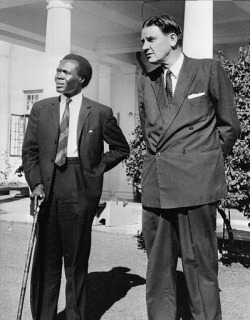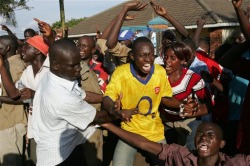Uganda: Struggle for Independence

Amy Larko
World History- Hjelmgren
Mini Paper #1
5/5/09, Period 7
Uganda: Struggle for Independence
In America during today’s society and in the past, we have taken independence/freedom for granted. Although in some parts of the world, there has been a struggle to gain independence including. Thankfully, Uganda had many leaders to help them out of the mess they were in. Without independence daily life can be affected and the Ugandan’s had to find a way to change their situation with it in order to maintain a normal lifestyle.
The people of Uganda were not always fighting for their independence, it all started in 1862, with John Hanning Speke from the British, who was adamant to find the source of the Nile River (Middleton). Ten years later the British along with missionaries declared control over Uganda, claiming they were weak and in need of powerful protection (Middleton). Due to the British coming to Uganda, the official language became English (Cavendish). But before that, the natives had been speaking Luganda and Swahili or other Bantu and Nilotic languages (Cavendish). Milton Obote who was the prime minister of Uganda, felt that with the British there they were a “lost country”, and once they had freed themselves things would go back to life without the British there(U.S. Library of Congress).
As time had pasted Obote and King Mutesa knew it was time for a change. With help from Uganda’s People’s Congress, they decided to make an agreement with the British in hope for independence (Melvin). Their act for independence was unlike any other, since there were different political parties that were organized to either “self-rule” or seek independence (Pike). The quest for independence began in 1958, and they finally received what they had asked for, independence, in 1962 (Marshall). Which is why Uganda’s national holiday, otherwise known as Independence Day is held October 9th, the official day Obote’s hard work had paid off (Marshall). During all of this though, the other leader Idi Amin had them plunged into a world of terror/corruption, as well as discriminated the Asians which in the end many were killed, or fled from Uganda (Middleton). As well as discriminating, Amin would threaten to kill anyone who did not believe in what he thought was best for Uganda, since he believed that he was always right (Middleton). Soon after things had finally cleared up and Idi Amin was gone, Uganda took a big step and held their own elections (Middleton). With Amin gone, even the British recognized the new regime in Uganda (U.S. Library of Congress). Since 1962, the British have left Uganda alone there have been 7 presidents and 8 more regimes (U.S. Library of Congress).
The fight for independence between Britain and Uganda was not necessarily as physical, or long as most, due to the good leaders they had. From the agreement they made with the British, to the crazy Amin, Uganda has stood strong through it all. Now with a new president Museveni they will be able to face any future problems dealing with their independence. Maybe even us Americans could learn a thing or two from the mature way the Ugandan people handled things…
Annotated Bibliography
Cavendish, Marshall. Peoples of Africa. “Uganda.” Volume 10. 2001.
This book informed me of the different languages spoken and when they started seeking for independence.
Independence: The Early Years. U.S. Library of Congress.
http://countrystudies.us/uganda/9.htm
I learned about Obote’s feelings on the situation, along with the different regimes.
Middleton, John. “Uganda.” Africa. 4th ed. 2002.
Not only did this source introduce me to the British arriving in Uganda, but it told me the details when Uganda gained their independence back.
Page E., Melvin. “Uganda.” Colonialism. Volume 2: N-Z. 2003.
This source was very helpful in naming the leaders/what what they did, to help to put forth effort in the struggle for independence.
Pike, John. “Uganda Independence” http://www.globalsecurity.org/military/world/war/uganda1.htm 2002.
This website informed me of the difference strategy from others that Uganda used to get independence.
“Uganda History.” World Geography. 2009. ABC-CLIO. 30 April. 2009. http://www.worldgeography.abc-clio.com.
This website told me the different names of the political parties and their importance in Uganda.
Lasted Updated: Amy, May 22 2009

